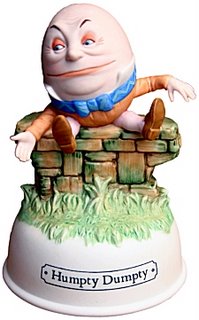 ... `When I use a word,' Humpty Dumpty said in rather a scornful tone, `it means just what I choose it to mean -- neither more nor less.'
... `When I use a word,' Humpty Dumpty said in rather a scornful tone, `it means just what I choose it to mean -- neither more nor less.'`The question is,' said Alice, `whether you can make words mean so many different things.'
`The question is,' said Humpty Dumpty, `which is to be master - - that's all.'
Alice was too much puzzled to say anything, so after a minute Humpty Dumpty began again. `They've a temper, some of them -- particularly verbs, they're the proudest -- adjectives you can do anything with, but not verbs -- however, I can manage the whole of them! Impenetrability! That's what I say!'
`Would you tell me, please,' said Alice `what that means?`
`Now you talk like a reasonable child,' said Humpty Dumpty, looking very much pleased. `I meant by "impenetrability" that we've had enough of that subject, and it would be just as well if you'd mention what you mean to do next, as I suppose you don't mean to stop here all the rest of your life.'
`That's a great deal to make one word mean,' Alice said in a thoughtful tone.
`When I make a word do a lot of work like that,' said Humpty Dumpty, `I always pay it extra.'
`Oh!' said Alice. She was too much puzzled to make any other remark.
`Ah, you should see `em come round me of a Saturday night,' Humpty Dumpty went on, wagging his head gravely from side to side: `for to get their wages, you know.'
(Alice didn't venture to ask what he paid them with; and so you see I can't tell you.)
`You seem very clever at explaining words, Sir,' said Alice. `Would you kindly tell me the meaning of the poem called "Jabberwocky"?'
`Let's hear it,' said Humpty Dumpty. `I can explain all the poems that were ever invented -- and a good many that haven't been invented just yet.'
This sounded very hopeful, so Alice repeated the first verse:
`Twas brillig, and the slithy toves
Did gyre and gimble in the wabe;
All mimsy were the borogoves,
And the mome raths outgrabe.
`That's enough to begin with,' Humpty Dumpty interrupted: `there are plenty of hard words there. "Brillig" means four o'clock in the afternoon -- the time when you begin broiling things for dinner.'
`That'll do very well,' said Alice: and "slithy"?'
`Well, "slithy" means "lithe and slimy." "Lithe" is the same as "active." You see it's like a portmanteau -- there are two meanings packed up into one word.'
`I see it now,' Alice remarked thoughtfully: `and what are "toves"?'
`Well, "toves" are something like badgers -- they're something like lizards -- and they're something like corkscrews.'
`They must be very curious looking creatures.'
`They are that,' said Humpty Dumpty: `also they make their nests under sun-dials -- also they live on cheese.'

`Andy what's the "gyre" and to "gimble"?'
`To "gyre" is to go round and round like a gyroscope. To "gimble" is to make holes like a gimblet.'
`And "the wabe" is the grass-plot round a sun-dial, I suppose?' said Alice, surprised at her own ingenuity.
`Of course it is. It's called "wabe," you know, because it goes a long way before it, and a long way behind it -- '
`And a long way beyond it on each side,' Alice added.
`Exactly so. Well, then, "mimsy" is "flimsy and miserable" (there's another portmanteau for you). And a "borogove" is a thing shabby-looking bird with its feathers sticking out all round -- something like a live mop.'
`And then "mome raths"?' said Alice. `I'm afraid I'm giving you a great deal of trouble.'
`Well, a "rath" is a sort of green pig: but "mome" I'm not certain about. I think it's short for "from home" -- meaning that they'd lost their way, you know.'
`And what does "outgrabe" mean?'
`Well, "outgribing" is something between bellowing and whistling, with a kind of sneeze in the middle: however, you'll hear it done, maybe -- down in the wood yonder -- and when you've once heard it you'll be quite content...